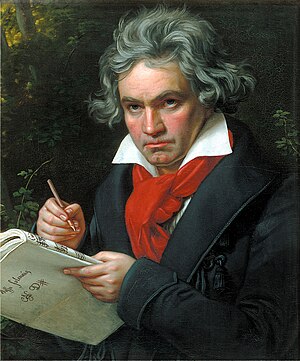Difference between revisions of "AY Honors/Music/Beethoven"
From Pathfinder Wiki
m (W126jep moved page Adventist Youth Honors Answer Book/Music/Beethoven to AY Honors/Music/Beethoven without leaving a redirect) |
|||
| (3 intermediate revisions by 2 users not shown) | |||
| Line 9: | Line 9: | ||
His two best know compositions are his Fifth and Ninth Symphonies. The entire fifth symphony is united as a musical idea by the four notes heard at the beginning of the piece. His ninth symphony is known for its ending piece which includes a choir singing “Ode to Joy”. | His two best know compositions are his Fifth and Ninth Symphonies. The entire fifth symphony is united as a musical idea by the four notes heard at the beginning of the piece. His ninth symphony is known for its ending piece which includes a choir singing “Ode to Joy”. | ||
| − | |} | + | |}<noinclude>[[Category:Adventist Youth Honors Answer Book/Transcluded Modules|{{SUBPAGENAME}}]]</noinclude> |
| − | [[Category:Adventist Youth Honors Answer Book/Transcluded Modules|{{SUBPAGENAME}}]] | ||

